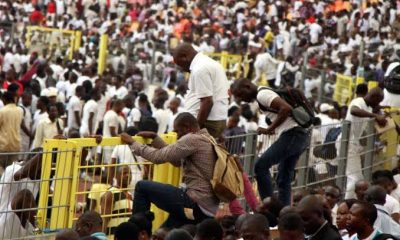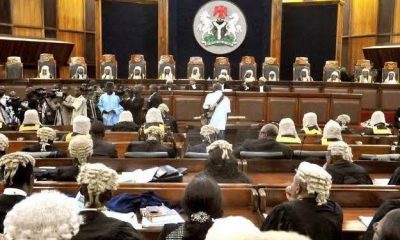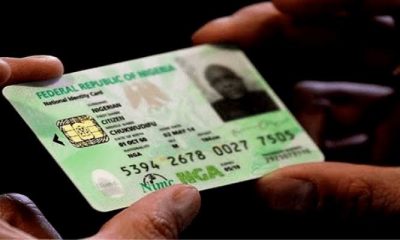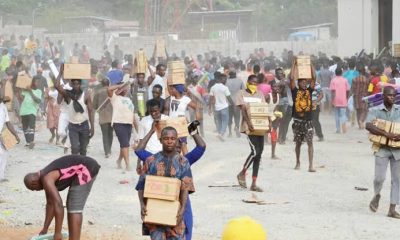Opinion
State Of Our Public Education And The Manifest Insensitivity Of The Governors

By Alex Enemanna
If you attended a public primary school in Nigeria between 70s and 90s, there is no way you won’t erupt in a justified anger over what has become of these primary education centres that hitherto produced notable and prominent members of our society. While it is a common knowledge that the tripod hierarchy of education vis a vis the primary, secondary and university have all become sanctuaries of overstretched absurdity and prolonged neglect, this intervention will scope within the primary education cycle and reserve the rot in public secondary schools and the universities for x-ray some other day.
In a November 2018 visit to Abia, the home state of this reporter, he consciously took a tour of some primary schools in Nvosi, IsialaNgwa South local government of the state. He was nearly moved to tears by the depth of infrastructural decay, if not a total absence of it that has greeted these once blossoming citadels of character formation and serious academic businesses.
His first point of call was Ebeyi Nvosi Community School where coincidentally he had his primary education in the mid 90s. He saw far less than a shadow of what was. It could perhaps retain its nomenclature as a school because the signboard which signposts the existence of an institution still stands on the exact spot where it was in the 90s but with no visible letter to show which kind of institution exists there. It communicates nothing because the inscription has been consumed by the rust of time and rot of no maintenance.
The time is 8:20am on a Wednesday morning. A closer view into the school compound does not suggest that any academic activity takes place there as no single pupil or teacher was seen. Bewildered. Dumbfounded. Troubled if he was in the right place, he quickly asked a middle aged man who was apparently rushing to his farm to beat the scourging sun of the season if the location was Ebeyi Nvosi Community School and he answer affirmative, heightening the already tensed apprehension of this reporter.
A section of the school structure that served as primary one to three class lecture hall has not only fizzled out of existence but has been totally overgrown with weeds, making it a perfect habitat for rodents, serpents and other harmful creatures. Haven’t yet been converted into farming field by the untoward activities of community trespassers, like other portions of the once expansive space.
A relatively fair spot where teaching and learning takes places according to his findings was erected through the collective efforts of the community. This is where all the pupils are lumped up on the dusty floor in most dehumanising learning environment known to mankind. This was put up for the pupils and their teachers to have a roof over their heads but without the least of learning kits apart from a charcoal black board carved out in a portion of the wall. Not even the usual drawing of the human skeletal system was seen through a window peep.
While this correspondent stays put, it took an exhaustive 40 minutes later for a lone female pupil of about 6 years to arrive the school environment with her plastic chair, when he decided to check what the situation is in a neighbouring Amaiyi Community School. This is not without asking the visibly low-spirited pupil if the day was not meant for study and she echoed “taa mbu school”. Her mates’ voices could he heard loud and clear in a nearby private school as the morning devotion has just activated them.
No significant difference in the next point of call. Same gory, awry tale of a people neglected with most callous insensitivity and reckless abandon by elected officials. The structures here are not good enough to house domestic animals, let alone being tagged a classroom.
Other public primary schools toured include Umunkpeyi, Obuba, Umuehim, Umuokiri, Umunevo, Umuetegha and Umuejea. It is a uniformed rot shared in all sense of equity and justice, as no one lags behind. In fact, no single pupil or teacher was seen anywhere in the school in Umunkpeyi the day this correspondent visited. Further enquiries revealed that the teachers have a week long conference in Omoba, the local government headquarters of IsialaNgwa South, which stalled academic activities for a whole week.
One would have thought that barrage of policies churned out by successive governments would have brought a face lift to our educational system with particular emphasis on primary education. This has not happened. The rot eats deeper by the day and the system rapidly slides into oblivion while the future of our children become more despondent and hope blurer. Though, they were not ideal public educational institutions in the real sense of it in the past 20 to 30 years, what obtains today may appear like an insult to the word “make shift” yes. It’s as bad as that they can’t be called make-shift schools.
We are nine years behind Abacha’s vision 2010 which projected a better educated population of young people between 5 and 24 and an increased enrollment in primary, secondary, and higher education. Now, with the humongous amount that runs into trillions of Naira according to the annual budget expended on this sector between 2010 to date among the federating units, are we better off than we were or our situation has become more precarious? Do you still wonder why poor educational system has greatly benefited protracted insecurity in our land including insurgency?
In 1999, the Federal government under Chief Olusegun Obasanjo introduced the Universal Basic Education (UBE) Programme as a reform programme aimed at providing greater access to, and ensuring quality of basic education throughout Nigeria. The UBE Programme objectives include Ensuring an uninterrupted access to 9-year formal education by providing FREE, and COMPULSORY basic education for every child of school-going age. The success of this programme, just like many other policies of the government does not exceed the paper on which it is written. The implementation is greatly watered down, if not flushed away totally.
It is usually strangled in the shrine of poor management, religion, ethnicity and corruption. Today, UBE exists only as a drain in our already skyrocketing wage bill that does not correspond with services or its shadows that emanate from these dormant agencies of the the government. School children today pay a humongous amount under the veneer of administrative costs that doubles the fees of a university student in the 2000s. Other interventionist programmes such as Education Trust Fund that later metamorphosed into Tertiary Education Trust Fund and the establishment of about 104 unity schools across Nigeria have not shown sufficient potency in addressing the challenges of our public educational system.
The problems associated with our primary education have become chronic, defying all forms of prescriptions while those elected by the people to preside over their security and welfare have made a hobby out of turning a deaf ear even as these challenges keep reinforcing viciously. How the state governors sleep with these myriads of problems under their pillows remain a mystery that has yet to be unveiled .
When it comes to feeding their sadism on the misery and plight of the people, the doctrine of federal character is duly observed. They jettison region, religion and colour of political party flag and unleash an orchestrated hardship on the people with all impunity they can muster.
In Abia for instance, where governor Okezie Ikpeazu last year claimed that primary school enrolment in the state had risen to 303,000 from 11,500 in 2015 when he assumed office appears like nothing short of a decorated lie going by what this correspondent saw and what was hitherto obtainable. Among the public primary schools toured by this correspondent, no one could boast of a maximum of 30 pupils, a situation the head teacher in Amaiyi Community School, Mrs. Adiele colloborated. According to her, the dwindling number of primary school enrollment is not unconnected with the mass rush by parents and wards to patronize private schools, which appear relatively functional while parents pay through their nose. She also said, backlog of salaries owed the teachers by the state government has greatly fractured their morale.
Paradoxically, the governors jumb over themselves to claim glory each time WAEC/NECO results are released and their state make a remarkable outing. They’re impersonators and interlopers pontificating in the efforts of the private schools.
According to a video documentary on TVC recently, Igbo-Ora in Oyo state could give public schools in Nvosi a bloody nose in a tournament to ascertain where dwells more rot than the other. The roofs are old, ancient and rotten. They were said to have been constructed by missionaries several decades ago. Not fit for any living to take a shelter in. The walls have large cracks that could house a rabbit, posing a serious hazard on whoever steps near.
In Osun, a recent viral photo showed how pupils sit under a tree on the bare floor to receive teaching. Hardly is there any state not caught in this quagmire of public education sliding into extinction. In fact, these pictures have become banals. They don’t get us raise eyebrow, neither are the governors concerned.
In 2017, president Buhari raised alarm over the deteriorating education in Nigeria during a Presidential retreat for members of the State Executive Council. Hear him “The state of education in Nigeria calls for a serious concern and that is why we are all gathered here today. The problem is no longer a secret that the quality of education in Nigeria requires greater attention and improvement.
“That our country is facing numerous challenges in education and all other sectors as a result of historical abuses, mindless impunity and corruption is not news to anyone. With an estimated 13.2 million children out of school, high illiteracy level, infrastructural deficit and decay, unqualified teachers, and inadequate instructional materials, to mention some of the challenges, we can clearly see the effect of decades of neglect that the education sector has suffered”.
The importance of education to any society that still wants to be recognized as one cannot be over-emphasised. The reason most, if not all the governors have perennially played politics with the future of our society is because their children do not school in Nigeria. They use our commonwealth to train their children in the best schools around the world while our people wallow in uncertainty and hopelessness.
Good education is the bedrock for more labour which will ultimately reposition our economy. Criminal activity and violence have resulted from a lack of youth education. New scientific and medicinal advancements can be made with better education systems. Upon it stands other areas of human profession.
As noted by the president, no doubt lack of qualified teachers, non-payment of teachers’ salaries and wages, dearth of infrastructure and others are factors militating against the improvement of our primary education system. Concerned by this menace, the Kaduna State governor in 2017 sacked about 22,000 unqualified teachers in the state who were said to have failed primary four exams. These are some of the decisive steps that must be taken to save our educational system from an imminent extinction.
The commercialisation of education vis a vis the private schools is not in the best interest of the common man. It is an evil day we unwillingly keep postponing while claiming that all is well. Those strangling public education to death today are all products of the same system they have waged a war against. What shall be your happiness if your children are in school and the children of your neighbour are hawking kunu and bitter kola all over the streets? The large gulf between the haves and have-nots have steadily sipped our milk of humanity while we nap. We lack the capacity to see and identify an impending catastrophy.
Finally, government, corporate organizations, religious bodies, well to do members of the society, the community, alumni associations must brace up for this challenge holding us by the jugular. While we may be deceived by the choreographed deceit of these state chief executives in the city public schools, the hard truth remains that the hinterlands are in sorry state. We must not fail our generations yet unborn.
Enemanna is an Abuja based journalist.











